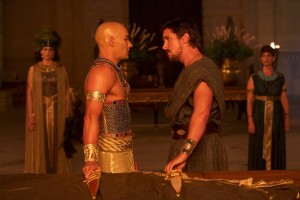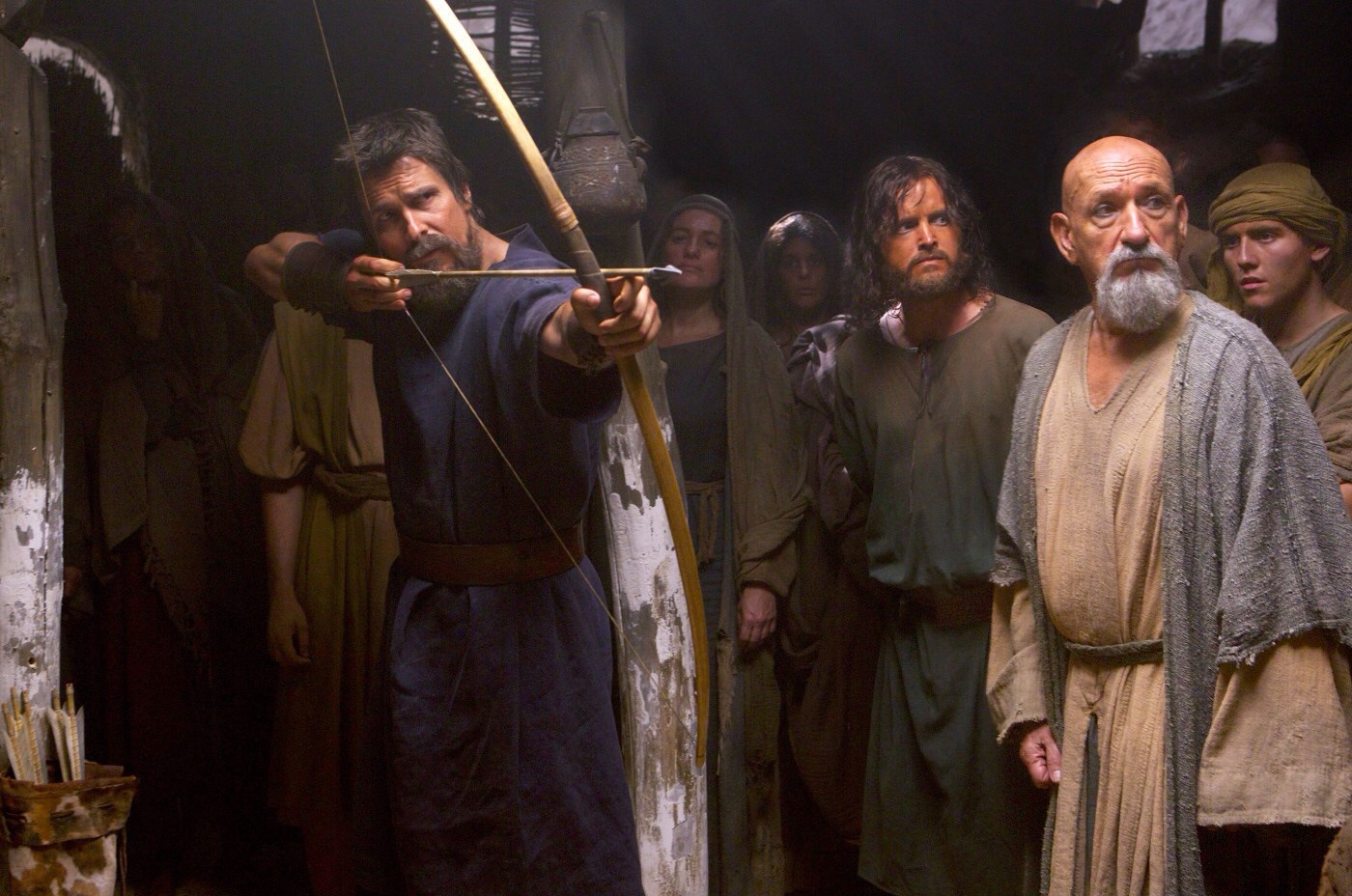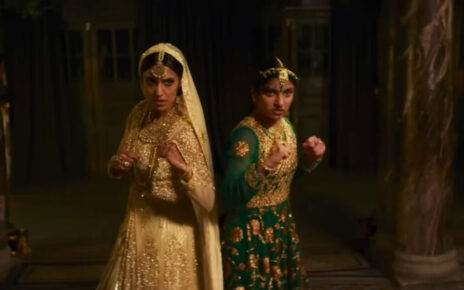Normally to see a “Christian” play a Jew, one has to attend a Nativity pageant. :rimshot: And yet, there’s Christian Bale as Moses as we all endure yet another faith-based tale on the big screen. In fairness, of the dozens of bible-inspired films of 2014, this might be the best. Well … top three at least. Certainly top 10. Yes. Exodus: Gods and Kings is definitively among the top ten big screen bible films of 2014.
I’ve given up asking that Middle Eastern people look Middle Eastern, let alone be Middle Eastern, so sure, let’s accept Christian as Moses, Joel Edgerton as Ramses and, hey! John Turturro as Seti. Well, that one almost makes sense – his roots lie just across the Mediterranean. John may even have some Egypt in his background. Sure, why not?
Far as I can tell here, Ridley Scott assumed we knew the tale of Moses so well, we didn’t need to be handled through the paces – Moses is Hebrew-born, but abandoned to save his life and raised as an orphaned Egyptian Prince. Years later, there’s a reveal and Moses is booted out of Egypt. He returns with God and anger, not necessarily in that order, and God gets medieval on Egypt’s ass. It’s the ultimate nature v. nurture tale – Moses is raised Egyptian, but denies his patronage for his birthright of slavery. When he rises up to lead the slaves from Egypt, is that the Egypt talking or the Hebrew talking?
And here it was a boy (Isaac Andrews) talking. God literally comes off as a petulant child with a slight case of rhotacism. If that isn’t enough, this is the most violent Moses ever portrayed. This Moses goes into battle swords a flyin’, and isn’t quite done after that. When Nun (Ben Kingsley) privately tells Moses of his parentage, Moses steps outside and kills a guard or two. Why? Don’t know. This Moses carries a sword for the majority of the film. Is this the new twist of our age? Is the divine nobility of Moses only acceptable if we see him as a soldier? Few human figures represent violence quite like Charlton Heston and yet even his Moses fought, reluctantly, with a staff. Give it a few years and the Moses we know will more closely resemble a Middle Earther instead of a Middle Easterner.
Moses builds and trains an army to battle pharaoh. Ok, that’s a new one. And then he attacks fishing boats. What did those guys do? And when Moses isn’t making enough progress, God literally steps in and says, “I’ll take it from here.” Then we get plagues. And it’s weird, because Exodus kind of wants us to believe in God and believe in science at the same time. Are the CGI plagues of frogs and locusts really the work of God, or just the side effects of the CGI crocs turning the Nile red? Never at any time does Moses say anything to the effect of, “witness the power of God!” He’s actually a pretty superfluous tool. I imagine those of the Jewish faith aren’t exactly pleased with this portrayal.
Joel Edgerton decided to play Ramses as a one-note king, constantly digging the same mildly annoyed expression out of his headdress for every scene – it’s something on the order of “somebody clearly parked in the space marked ‘PHARAOH ONLY.’ Should I do something about this?” I swear, this is what he does all film long: Wins a battle? Mildly annoyed. Brother betrays hilm? Mildly annoyed. Son dies at the hands of the the Hebrew God? Mildly annoyed.
does all film long: Wins a battle? Mildly annoyed. Brother betrays hilm? Mildly annoyed. Son dies at the hands of the the Hebrew God? Mildly annoyed.
Exodus: Gods and Kings is shockingly short on both faith and emotion. My guess would be that Ridley Scott figured we all knew the tale so well, we could skip over that part. But, Ridley, the Hebrews have been slaves to Egypt for 400 years … for GOD sakes, man. Not one celebration? Not one moment of “do you think we’ve seen our deliverer?” Not even a good “let my people go!” scene. Heck, there’s not much of anything here – Ramses goes from blood brother to “get the Hell out of Egypt” in about five lines of dialogue. And all without raising his temper. Moses goes from non-bleliever to the tool of God in less time than that. Where are the transitions? Why do the Hebrews blindly believe Moses is the instrument of God? Would it kill you to make the parting of the Red Sea actually look, you know, biblical?
I’m not a huge fan of faith in movies. I find it detracts from the human element and often abbreviates plots. But here’s a man who talked directly to God and led people out of slavery. You’re allowed to show some genuine divinity. Yet, this Exodus doesn’t give Moses a whole lot of credit; it mostly just makes him play bystander –like everybody else- while “miracles” happen. Hence, Exodus comes off as neither a great exploration of faith, nor a geat biopic. Gimme Charlton Heston. Gimme obvious movie sets, ridiculous make-up and a complete lack of subtlety. And, for God sake, let the Hebrews celebrate, will ya?
♪When Moses went in Egypt’s land
Let’s give Pharaoh a show
Train those slaves in their free time
With bow and arrow
No, no Moses
Not what I had in mind
I’ll tell Pharoah myself
Let MY people go♫
Rated PG-13, 150 Minutes
D: Ridley Scott
W: Adam Cooper, Bill Collage, Jeffrey Caine and Steven Zaillian
Genre: Revisionist history
Type of person most likely to enjoy this film: people who are going to love a bible film no matter what it offers
Type of person least likely to enjoy this film: Moses
♪ Parody inspired by “Let My People Go”



